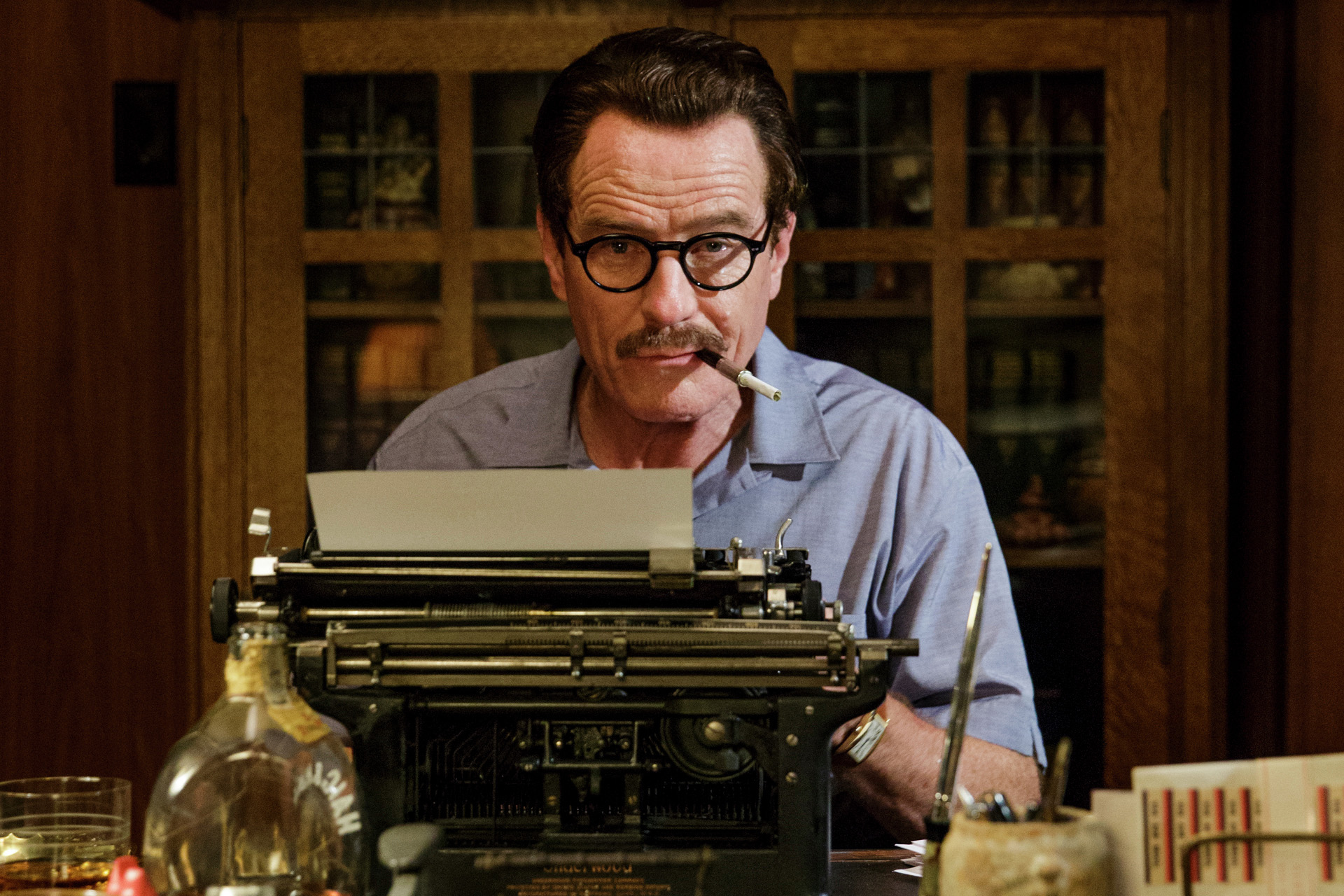 TRUMBO (dir. Jay Roach, 2015) is a love letter to Left progressives, an intellectual and spiritual uplift that reaches out with tenderness to writers, activists, and film lovers for an exploration of one of the most awful moments of American domestic governance in the past century. Despite dealing with the McCarthy Red Scare era and the Cold War, it has within it lessons about loving one’s neighbor despite differences that are tremendously vital, particularly when one recognizes the shift from a fear of Communism to Islamism and how the recent vitriol about Syrian refugees mirrors the nonsensical paranoia about Reds under the bed six decades ago. Jim Langevin and Elaine Morgan might learn a thing or two from this movie.
TRUMBO (dir. Jay Roach, 2015) is a love letter to Left progressives, an intellectual and spiritual uplift that reaches out with tenderness to writers, activists, and film lovers for an exploration of one of the most awful moments of American domestic governance in the past century. Despite dealing with the McCarthy Red Scare era and the Cold War, it has within it lessons about loving one’s neighbor despite differences that are tremendously vital, particularly when one recognizes the shift from a fear of Communism to Islamism and how the recent vitriol about Syrian refugees mirrors the nonsensical paranoia about Reds under the bed six decades ago. Jim Langevin and Elaine Morgan might learn a thing or two from this movie.
CLICK HERE FOR SHOWTIMES AND TICKETS AT THE CABLE CAR!
The film spans from about 1947 to 1960 and addresses the period when Dalton Trumbo (played by Bryan Cranston in an Oscar-worthy role) and nine of his colleagues were placed on the Hollywood Blacklist due to their refusal to cooperate with the House Committee on Un-American Activities (HUAC). First sent to jail and then prevented from working in not just film but almost any industry, the group ended up writing B-grade scripts using pseudonyms and secretive couriers to make a living. He ended up earning two Oscars during this period and was unable to collect them until Kirk Douglas hired him to do rewrites on the troubled SPARTACUS film and listed him in the credits, effectively breaking the embargo.
Disclosing this history is nothing new, all of this is public record. Furthermore, the virtues of the film are not in the narration but the portrayals. Previous to viewing this film, I had seen the 2007 documentary, also titled TRUMBO, and so I had become familiar with the historic personage and biographical details at hand. Cranston is fantastic in this film. He becomes Dalton Trumbo, exhibiting his mannerisms, quirks, and frailties, embodying the tragedy an entire generation of Leftists faced after World War II.
For those who are unclear, a brief summary is in order. From 1935 to 1939 and again from 1941 to 1945, the Communist Party USA engaged in a broad-base, big tent political strategy called the Popular Front. Using rhetoric like ‘Communism is the Americanism of the 20th Century’ and creating propaganda materials that positioned Washington, Lincoln, Lenin, and Stalin in the same revolutionary spectrum, they achieved a degree of popularity among progressive-leaning liberals, especially in the entertainment and publishing industries, that were disenchanted with the shortcomings of the Roosevelt administration when it came to things like African American and women’s rights. Dalton Trumbo, like so many others, joined the CPUSA without any understanding of the brutality of the Stalin regime that would be disclosed by the 1956 Khrushchev Secret Speech and instead, much in the way Bernie Sanders seems to be trying to push the Democrats to the Left, voted for FDR while agitating for a more progressive set of policies. He and so many thousands of people were destroyed by McCarthyism not because they were spies, as some reviewers of this film are now claiming, but because they supported labor, minority, and feminist causes that were set back a decade or more because of the Red Scare. This was a moment where men and women were put in jail for exercising their First Amendment rights regarding a political party and ideology that did advocate peaceful coexistence with the Soviet and Chinese Communist countries but also opposed lynching, segregation, and sexism. And to be abundantly clear, this was not just targeting Communist Party members, the net was so wide it ended up ensnaring a good many liberals and Democrats who were merely caught associating as Fellow Travelers with members of a political party.
Louis C.K. also is worthy of awards here for his supporting role of Arlen Hird. A veteran of the Abraham Lincoln Brigade and chronically-ill writer whose family abandons him due to the stress, he is in many ways Trumbo’s conscience and moral barometer. For example, he is willing to hold Trumbo’s feet to the fire over the fact he says he is a member of the proletarian vanguard party while living on a large estate with horses and a lake. In another sequence, the two have an argument over injecting Marxist themes into their screenwriting that cuts to the core of the moral dilemma writers on the Left have always faced, how to create entertaining material that both serves as agitprop and an income generator in a capitalist system, a conversation I have with my editors to this day. In this character I found a reflection of myself and colleagues at the publications I write for.
To imagine Jeffrey St. Clair, Bob Plain, or myself being sent to jail and then stripped of our ability to write is a haunting, dystopian vision of totalitarianism in a somewhere else, be it Soviet Russia or Nazi Germany, but the reality is that it did happen here, people died because of it, and we have yet to build a monument to victims of this terror. Instead, there are still crazy people in the publishing world who are trying to vindicate McCarthyism! And even when the mainstream press talks about McCarthyism, it is not about how wrong the entire thing was to begin with (which it was) but instead how he went too far in accusing Dwight Eisenhower of being a Commie symp during the Army-McCarthy hearings. With the exception of perhaps Victor Navasky’s 1980 volume Naming Names (a title which itself has some troubled spots), there is very little willingness to say with a robust voice that there was nothing wrong with being a Communist and that the entire episode was a disgrace.
Or perhaps we should say these things in the past tense now as Jay Roach has finally said it out loud.
The film is also an achievement that plays a subtle game with notions of media that can be called post-modern while not venturing too far into the morass like that of Derrida that can be called post-thinking. It uses a variety of film stock textures, camera lens apertures, and sound qualities to bring the story to life through the medium that broadcast it to millions, newsreels in the final days before the proliferation of television and newspapers. This is a film about an awful episode in media history and it is fully aware of this in how it utilizes intertextuality.
I will not say the film is perfect, I think it lost the opportunity for a great comedic sequence by failing to detail the period the writers spent in Mexico boozing and writing. It also fails to deal at all with the fact that the two films that broke the blacklist by listing Trumbo’s name, EXODUS and SPARTACUS, were proto-hasbara propaganda films that had some pretty awful issues with racism and homophobia on reflection. Furthermore, it would have been interesting to include at least a mention of the struggles African Americans like W.E.B. Du Bois or Paul Robeson faced due to their Communist Party affiliations, a moment when McCarthyism truly showed its racist side. Yet in a time when our society is filled with the same kind of paranoia due to alleged foreign infiltration, TRUMBO is the film we need more than ever and to deny such is to deny reality.


